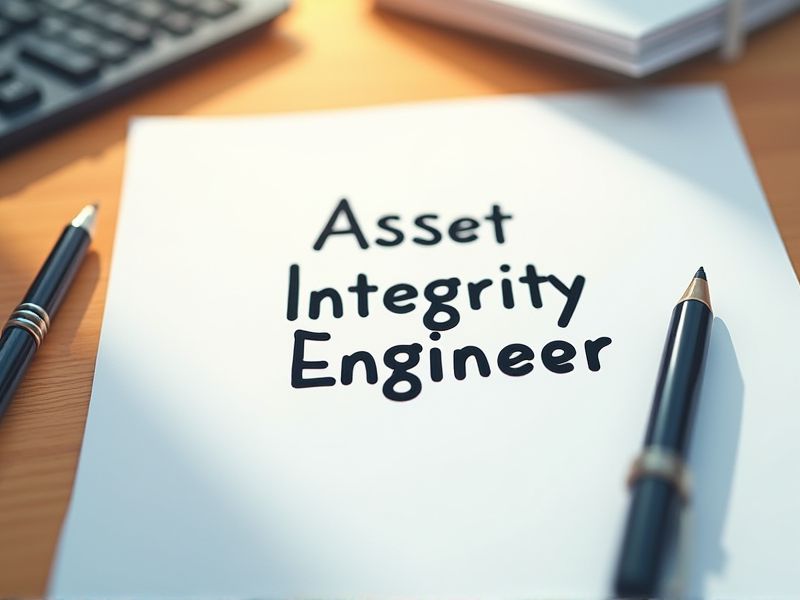
Asset Integrity Engineers play a crucial role in ensuring the longevity and safety of industrial assets. Certifications provide them with the necessary knowledge and skills to effectively manage risks associated with asset performance. These credentials validate their expertise in regulatory compliance, risk assessment, and maintenance strategies. Here are some essential certifications you might consider as an Asset Integrity Engineer.
API 510 Pressure Vessel Inspector Certification
The API 510 Pressure Vessel Inspector Certification provides an Asset Integrity Engineer with a standardized understanding of pressure vessel inspection and maintenance protocols, ensuring safety compliance. This certification validates the engineer's ability to detect potential failures or risks in pressure vessels, enhancing preventative maintenance strategies. Employers often require this certification to guarantee that asset integrity practices align with industry regulations and standards. The presence of API 510 certification in an Asset Integrity Engineer's credentials can reduce costs associated with unexpected downtime by ensuring thorough inspection and repair procedures.
API 570 Piping Inspector Certification
API 570 Piping Inspector Certification enhances an Asset Integrity Engineer's expertise in maintaining and inspecting piping systems, ensuring they meet industry standards. This certification provides engineers with critical skills to accurately assess the condition of piping infrastructure, which in turn reduces the risk of failures. By obtaining this certification, engineers can assure stakeholders of adherence to safety regulations and improve operational reliability. The certification also keeps engineers updated on the latest inspection practices and technological advancements in the field.
API 653 Aboveground Storage Tank Inspector Certification
API 653 certification is essential for an Asset Integrity Engineer because it verifies proficiency in inspecting and maintaining storage tanks to ensure safety and compliance. It enhances the engineer's ability to identify potential risks and prevent failures, reducing the likelihood of environmental hazards and costly incidents. Knowledge of API 653 standards enables engineers to execute effective inspection programs that extend the lifespan of storage tanks. This certification strengthens credibility and trust with stakeholders by ensuring adherence to industry standards.
API 580 Risk Based Inspection Certification
Obtaining the API 580 Risk Based Inspection Certification equips an Asset Integrity Engineer with advanced knowledge of assessing and managing risks associated with equipment and infrastructure. The certification ensures engineers can formulate more effective inspection plans, which reduces unplanned downtime and maintenance costs. An engineer with this credential can better prioritize inspections and maintenance activities, enhancing overall safety and reliability. Organizations benefit from an engineer holding this certification as it aligns with industry standards and best practices, thereby bolstering regulatory compliance.
API 581 Risk Based Inspection Certification
The API 581 Risk Based Inspection Certification equips an Asset Integrity Engineer with the necessary skills to implement risk-based inspection methodologies effectively, improving asset reliability and safety. By understanding and applying this standard, engineers can prioritize inspection and maintenance efforts based on quantified risk, optimizing resource allocation and reducing operational costs. This certification enhances an engineer's ability to assess the probability and consequences of equipment failure, leading to more informed decision-making. In the long term, it helps in maintaining compliance with industry standards and regulations, mitigating potential legal and financial repercussions.
NACE Coating Inspector Certification
NACE Coating Inspector Certification enhances an Asset Integrity Engineer's ability to assess and verify coating applications, crucial for preventing asset degradation. The certification equips engineers with standardized knowledge, minimizing coating failures and extending the lifespan of assets. It ensures compliance with industry standards, reducing the risk of costly repairs and downtime. Acquiring this certification boosts credibility and competency in maintaining asset value and safety.
Certified Maintenance & Reliability Professional (CMRP)
The Certified Maintenance & Reliability Professional (CMRP) certification is crucial for an Asset Integrity Engineer because it validates their understanding of best practices in maintenance and reliability. It enhances an engineer's ability to design and implement effective asset management strategies, ensuring long-term asset performance. Expertise in reliability engineering techniques gained through CMRP can reduce downtime and maintenance costs. Having this certification often results in improved safety standards and compliance with industry regulations.
Certified Reliability Engineer (CRE)
A Certified Reliability Engineer (CRE) provides in-depth knowledge of reliability principles that enhance the predictive maintenance strategies crucial for an Asset Integrity Engineer. CRE expertise directly leads to reduced equipment downtime by identifying potential failures early, which directly impacts asset lifespan and operational efficiency. Their proficiency in statistical analysis and risk assessment equips Asset Integrity Engineers with the tools necessary to optimize asset performance and ensure safety compliance. As industries push for higher operational reliability, the skills of a CRE become pivotal in developing cost-effective maintenance regimes.
AWS Certified Welding Inspector (CWI)
AWS Certified Welding Inspector (CWI) plays a crucial role in ensuring welding quality, impacting the structural integrity of assets directly. Asset Integrity Engineers rely on CWIs to verify and ensure that welding meets specified standards, reducing the risk of structural failures. Proper welding inspection by a CWI helps in maintaining reliability and safety, which are critical for asset management. Their expertise aids in identifying potential issues early, minimizing downtime and repair costs.
Lean Six Sigma Black Belt Certification
The Lean Six Sigma Black Belt Certification equips Asset Integrity Engineers with advanced problem-solving skills, leading to improved process efficiencies. Enhanced analytical capabilities help in identifying defects and inefficiencies in asset management, reducing maintenance costs. It fosters a data-driven mindset, crucial for making informed decisions on asset lifespan and reliability. The certification enhances leadership and project management abilities, enabling efficient team coordination and project execution in complex engineering environments.
Summary
When you obtain certifications as an Asset Integrity Engineer, you can enhance your credibility and demonstrate your expertise in maintaining system reliability. Certification leads to improved job opportunities as employers often seek certified professionals to ensure compliance and safety. Industry recognition increases, resulting in better collaboration opportunities with peers and stakeholders. Your proficiency and knowledge in industry standards are validated, leading to more efficient asset management.
